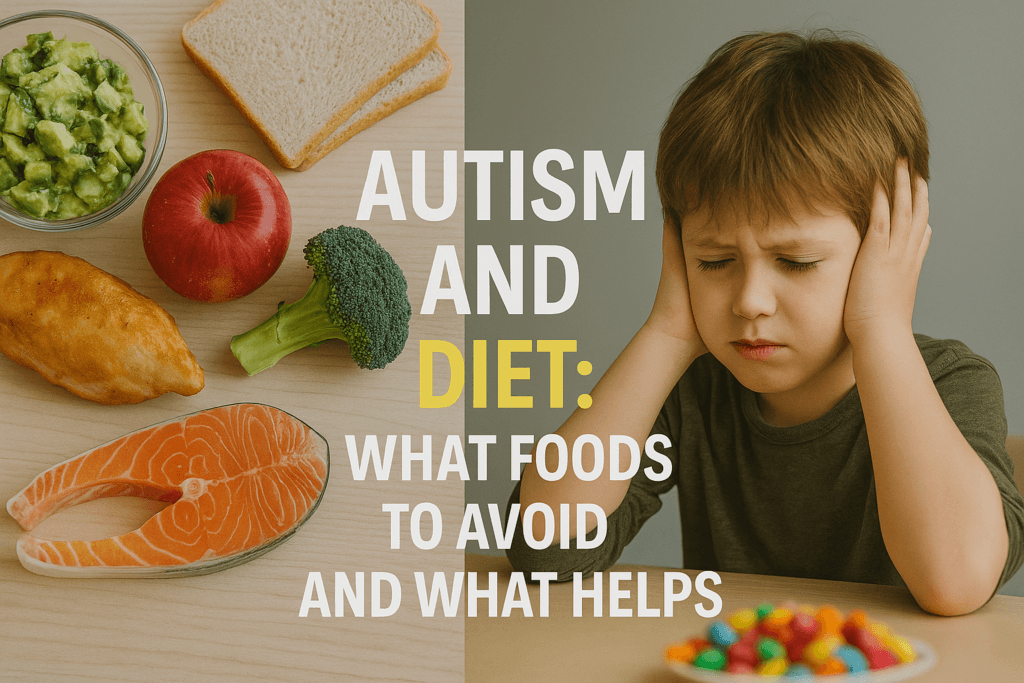🍽️ Introduction
When it comes to managing autism spectrum disorder (ASD), diet plays a surprisingly powerful role. Although food isn’t a cure, the right autism diet can support brain function, reduce behavioral issues, and improve overall health. From avoiding processed junk to boosting the gut-brain connection, let’s explore how thoughtful eating can make a difference for your child or loved one with autism.
🔬 The Science Behind Autism and Diet
Research increasingly suggests that children with autism often struggle with gastrointestinal (GI) issues, food sensitivities, and inflammation. These physical challenges may worsen symptoms like:
- Hyperactivity
- Aggression
- Digestive issues
- Sleep disturbances
That’s why nutritionists and autism specialists often recommend specific dietary interventions tailored for individuals on the spectrum.
💬 “We don’t treat autism with food, but food helps us treat the child better.” — Dr. Elizabeth Strickland, Registered Dietitian and Autism Nutrition Expert
🚫 Foods to Avoid in an Autism Diet
A few food groups are commonly reported to exacerbate autism-related symptoms. Consider limiting or eliminating these:
1. Gluten
- Found in wheat, barley, rye
- May trigger inflammation in the gut
- Can contribute to brain fog and irritability
2. Casein
- Protein found in dairy products
- May cause similar issues as gluten
- Consider dairy-free alternatives like almond or oat milk
3. Sugar and Artificial Sweeteners
- Leads to energy spikes and behavioral crashes
- Artificial sweeteners may affect brain chemistry
4. Processed Foods & Additives
- Artificial colors (like Red 40) and preservatives have been linked to hyperactivity
- MSG and high-fructose corn syrup should be avoided
5. Soy and Corn (GMO-heavy)
- May trigger allergic reactions
- Linked with hormonal disruption
✅ What Foods Help Children with Autism?
The ideal autism diet includes nutrient-rich, whole foods that reduce inflammation and support brain health. Here’s what experts recommend:
1. Omega-3 Rich Foods
- Wild salmon, flaxseed, chia seeds
- Supports brain development and reduces anxiety
2. High-Fiber Vegetables
- Broccoli, spinach, sweet potatoes
- Supports healthy digestion and detox
3. Fermented Foods (Probiotics)
- Yogurt (dairy-free), kimchi, sauerkraut
- Improves gut flora, which may benefit mood and immunity
4. Lean Proteins
- Turkey, chicken, lentils
- Provides essential amino acids for neurotransmitter production
5. Complex Carbs
- Quinoa, brown rice, oats
- Help balance blood sugar and improve focus
🧠 Autism Diet Supplements (Ask Your Doctor First!)
While food is the foundation, many parents explore supplements to support their child’s development. Always consult your pediatrician before adding any of these:
- Multivitamin (especially B6, B12, and folate)
- Probiotics
- Magnesium and zinc
- Fish oil or DHA supplements
- Digestive enzymes
🏠 A Sample Daily Autism Diet Plan
| Meal | Suggestions |
|---|---|
| Breakfast | Gluten-free oats, berries, almond milk |
| Snack | Apple slices with sunflower seed butter |
| Lunch | Grilled chicken, quinoa, steamed broccoli |
| Snack | Carrot sticks with hummus |
| Dinner | Salmon, sweet potato, sautéed spinach |
| Optional | Magnesium-rich banana smoothie |
💡 Tips for Transitioning to an Autism Diet
- Start slow: Replace one meal at a time
- Involve your child in shopping and cooking
- Use visual food charts for autistic children
- Praise and reward dietary progress
- Keep a food & behavior journal
❤️ Support Autism Wings Inc.
At Autism Wings Inc., we believe in creating holistic support systems for children with autism—including nutritional education, therapy, and soon, a dedicated school!
We’re currently raising funds to build a specialized Autism School that nurtures every aspect of development. Your contribution can change lives.
👉 Donate Now
🔚 Final Thoughts
There’s no one-size-fits-all autism diet, but making informed, consistent changes can bring real benefits. Pay attention to your child’s reactions, speak to medical professionals, and most importantly, stay patient and hopeful.
By empowering families through nutrition, we pave a path to brighter days—one bite at a time.

